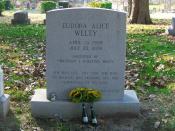According to the Social Anxiety Network, "Social anxiety is a fear of social situations and the interaction with other people." Put another way, social anxiety is the fear and anxiety of being judged and evaluated negatively by other people, leading to feelings of inadequacy, embarrassment, humiliation, and depression. People with social anxiety may know that their anxiety is irrational and does not make "head" sense. Nevertheless, "knowing" something is not the same thing as "believing" and "feeling" something. Social anxiety is a major factor in the stories: "Barn Burning" by William Faulkner, "The Man Who Was Almost a Man" by Richard Wright and, "A Worn Path" by Eudora Welty.
First, in William Faulkner's "Barn Burning," the main character in the story is a little boy named Colonel Sartoris. In this story, Sarty is faced with the decision of either going along with the views and actions of his morally challenged father or by running away and leaving his family and his pain behind.
Sarty gains his freedom when he decides to warn the de Spains because his father's violation of his own sort of morality frees him from what he calls the "pull of blood," or duty to his family (Faulkner 356). Sarty believes he is prepared to defend his father at the trial: "He aims for me to lie, he thought, and I will have to do it," and he fights the boy twice his size who calls out, "Barn burner!"(Faulkner 349). He hopes that the fires will end, thinking, "Maybe he's done satisfied now," but when Abner begins to set ablaze his next barn, Sarty extinguishes the family ties (Faulkner 358). This violation liberates Sarty from the "the old blood which he [has] not been permitted to choose for himself" (Faulkner...


